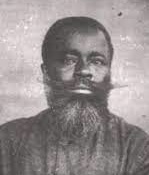Chief Oko Jumbo
Chief Oko Jumbo (died 1891) was a prominent 19th-century political leader in the Kingdom of Bonny, now part of Rivers State, Nigeria. Though not of Ijo origin, he rose from humble beginnings—originally a freed slave of Igbo descent—to become one of the most powerful chiefs in Bonny. For many years, Oko Jumbo was effectively the de facto ruler of Bonny, sharing influence with Jaja of Opobo.
Background
The Kingdom of Bonny, also known as Ibani, was a major center in the Atlantic slave trade, later transitioning to palm oil commerce under British pressure in the 19th century. It was traditionally inhabited by the Ijo people.
Rise to Power
Oko Jumbo became wealthy through trade and rose to prominence in the Manilla Pepple House, one of the key ruling houses of Bonny. Upon King Dappa’s death in 1855, he was consulted by British officials as a political stakeholder. He and Banigo dominated the Manilla Pepple House, even placing a figurehead (Warribo) as head after failing to agree on a successor. Despite restoration of King George Pepple in 1866, Oko Jumbo remained a major political force.
Education and Religion
Jumbo supported Christian missionaries and even learned to read and write. He enrolled thirteen of his children in school and in 1867 joined King George in renouncing Bonny's traditional deity, the Monitor Lizard. However, he later withdrew support when he felt that Christianity was weakening the authority of the chiefs.
Civil War and Conflict with Jaja
Oko Jumbo’s rivalry with Jaja (Jubo Jubogha) of the Anna Pepple House led to unrest, culminating in civil war in 1869. Jaja relocated and founded Opobo, gaining control of the major palm oil routes. Despite a peace treaty in 1873, tensions continued. Both leaders built up large, armed forces—each capable of fielding up to 8,000 men with breech-loading rifles.
Later Years
By the 1880s, relations between Jumbo and other Bonny chiefs deteriorated. He attempted to install his son on the throne, but failed. In 1885, he visited England with his sons Herbert and James, receiving notable attention. However, his power waned after the 1886 British protectorate treaty. King George Pepple was reinstated, Christianity was restored, and Jumbo was politically marginalized. He reportedly retired inland, leaving affairs to his son Herbert.
He died around 1891, the same year his rival Jaja died in exile.
Appearance and Personality
Descriptions of Oko Jumbo depict a tall, intelligent, well-built man, inclined to elegance and hospitality. He was known to travel in a long canoe paddled by 24–30 boys and often hosted European guests with refined meals. Even after his fall from power, he was remembered as a grand, old-fashioned leader with a powerful presence.
Legacy
Oko Jumbo’s legacy lies in his dominance of Bonny politics, his role in reshaping the kingdom during the colonial transition, and his complex relations with British missionaries, King George, and Jaja of Opobo.
